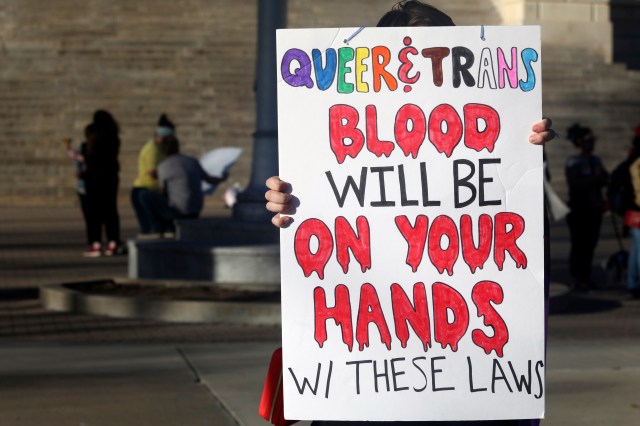
After decades of creating laws that assumed “sex” and “gender” were synonymous, lawmakers across the country are taking another look at how states define those terms.
Scientific and legal interpretations of these words have evolved considerably in the past century. Today, medical experts understand biological sex assigned at birth as more complex and consider it distinct from gender identity.
In 2020, the Supreme Court also broadened its understanding of sex discrimination in employment to include discrimination based on sexual orientation and gender identity.
Grappling with this cultural, scientific, and legal shift in the meaning of “sex” and “gender,” lawmakers in some states have tried defining the terms narrowly in state law as biological and binary. In 2023, four states passed such laws and, this year, 17 states introduced bills defining “sex.” Some bills in Florida and West Virginia were defeated, but 15 bills are still advancing in states across the country.
This focus on terminology may seem rhetorical, but these legislative changes can restrict access to driver’s licenses and documents that match a person’s gender identity. Transgender rights advocates say that requiring IDs to match the sex a person was assigned at birth can expose transgender Americans to discrimination.
So, how do we understand these terms, and what could these definitions mean for everyday life once codified?
Until the mid-20th century, Americans’ understanding of “sex” was largely biological and binary.
“For a substantial time period, law in the United States defined identity categories, such as race and sex, in biological terms,” said Darren Hutchinson, an law professor at Emory University law professor.
In the 1950s and ’60s, psychological research emerged that differentiated biological sex from “gender.” Researchers coined terms such as “gender roles” as they studied people born with reproductive or sexual anatomy that didn’t fit the typical definitions of male or female and observed how children sometimes developed identity distinct from their biological sex.
By the early 1960s, the term “gender identity” began appearing in academic literature. By 1980, “gender identity disorder of childhood” was included in the Diagnostic and Statistical Manual of Mental Disorders’ third edition. This inclusion signaled that the concept of gender identity “was part of the accepted nomenclature being used,” said Dr. Jack Drescher, a clinical professor of psychiatry at Columbia University.
Before the 1970s, the word “gender” was rarely used in American English, according to research by Stefan Th. Gries, a linguistics professor at the University of California, Santa Barbara. He said evidence suggests it was used mostly when discussing grammar to describe the “gender” of a noun in Spanish, for example.
Edward Schiappa, a professor of communication and rhetoric at the Massachusetts Institute of Technology, observed in his book “The Transgender Exigency” that the rising use of “gender” in English coincided with the term’s introduction into psychological literature and its adoption by the feminist movement. Feminists saw the term as useful for describing the cultural aspects of being a “woman” as different from the biological aspects, he said.
Supreme Court Justice Ruth Bader Ginsberg, who argued sex discrimination cases before the court in the 1970s, said that she intentionally used the term “gender discrimination” because it lacked the salacious overtones “sex” has.
After the 1980s, gender’s term usage rose rapidly, moving beyond academic and activist circles. In common American English, “sex” and “gender” began to be used more interchangeably, including in state law — sometimes even in the same section of the law.
In Florida’s chapter on driver’s licenses, for example, the section on new license applications uses “gender,” but the section on replacement licenses uses “sex.”
Today, medical experts and most major medical organizations agree that sex and gender are different.
Sex is a biological category determined by physical features such as genes, hormones and genitalia. People are male, female or sometimes have reproductive or sexual anatomy that doesn’t fit the typical definitions of male or female, often called intersex.
Gender is different, experts say. Gender identity refers to someone’s internal sense of being a man, woman, or a nonbinary gender. For cisgender people, their sex and gender are the same, while transgender people may experience a mismatch between the two — their gender may not correspond to the sex they were assigned at birth.
Our legal understanding of “sex discrimination” has also evolved.
In 2020, the Supreme Court decided Bostock v. Clayton County, a series of cases in which employers were accused of firing employees for being gay or transgender. The court held that this was a form of “sex discrimination” prohibited under Title VII of the Civil Rights Act of 1964.
Whether the court will extend this interpretation to other areas of federal law is unclear, legal experts told us.
Recently, lawmakers have tried to codify their understandings of “sex” and “gender” into law.
In some cases, these laws aim to recognize and protect transgender Americans. The Democratic-backed Equality Act, which passed the House, but not the Senate, in 2019 and 2021, would have federally protected against discrimination based on sex, sexual orientation and gender identity. Some states have passed similar equality legislation, creating a patchwork of anti-discrimination protections for LGBTQ+ people.
But lawmakers in many Republican-led states have proposed narrow definitions of sex and gender that would apply to large sections of state law. “Women and men are not identical; they possess unique biological differences,” Iowa’s Republican governor, Kim Reynolds said in a press release detailing her support for the state’s version of such a bill. She added, “This bill protects women’s spaces and rights afforded to us by Iowa law and the Constitution.”
Opponents reject the idea that the bills relate to women’s rights and claim the bills are an attempt to “erase” legal recognition of transgender people.
In 2023, four states passed laws defining sex, and two other states did so via executive order.
The Kansas Legislature, for example, passed the “Women’s Bill of Rights” overriding Democratic Gov. Laura Kelly’s veto. The law says that “pursuant to any state law or rules and regulations … An individual’s ‘sex’ means such individual’s biological sex, either male or female, at birth.”
The law defines male and female as based on whether a person’s reproductive system “is developed to produce ova,” or “is developed to fertilize the ova of a female.”
Because of the bill, transgender Kansans may no longer amend the sex listed on their birth certificates or update their driver’s licenses to be different from their sex assigned at birth, although courts are reviewing this policy.
The Kansas law also states that “distinctions between the sexes with respect to athletics, prisons or other detention facilities, domestic violence shelters, rape crisis centers, locker rooms, restrooms and other areas where biology, safety or privacy are implicated” are related to “important governmental objectives” a condition required under the equal protection clause of the U.S. Constitution’s 14th Amendment.
Rose Saxe, lawyer and deputy project director of the LGBTQ and HIV project at the American Civil Liberties Union, said the Kansas law does not explicitly require those spaces to be segregated by “sex” as the bill defines, but tries to justify policies that would do so.
This year, 17 more states considered bills that would narrowly define “sex” and/or “gender” in state law according to the ACLU’s anti-LGBTQ legislation tracker. One, Utah, signed a definition into law, and 10 other states are advancing 15 bills combined. In the remaining six states, the bills were carried over to next year or defeated.
Some bills, such as Arizona’s S.B. 1628 change the terms for the entire statute: “This state shall replace the stand-alone term ‘gender’ with ‘sex’ in all laws, rules, publications, orders, actions, programs, policies, and signage,” it reads. The state Senate passed the bill 16-13 on Feb. 22, along party lines with Republicans in favor.
Other bills, such as Idaho’s H.B. 421, don’t replace the word “gender” but declare it synonymous to “sex.” Gender, when used in state law, “shall be considered a synonym for ‘sex’ and shall not be considered a synonym for gender identity, an internal sense of gender, experienced gender, gender expression, or gender role,” reads the text of the bill, which passed the Idaho House 54-14 on Feb. 7.
Saxe said the bills could have a cascading effect on other laws.
Two bills in Florida, neither of which passed, would have explicitly required driver’s licenses to reflect sex assigned at birth. Advocates, including Saxe, worry that other sex-defining bills would have a similar consequence.
Transgender rights advocates say access to identification that matches an individual’s identity and presentation is important. “If you can’t update the gender marker on your ID, you are essentially outed as transgender at every turn,” said Rodrigo Heng-Lehtinen, executive director of the National Center for Transgender Equality to PolitiFact for a previous story on drivers licenses in Florida. This can happen during interactions with potential landlords, employers, cashiers, bartenders and restaurant servers.
Kentucky and Georgia are following Kansas’s lead and considering their own “Women’s Bill of Rights” based on model legislation created by the conservative advocacy group, Independent Women’s Voice, and the Women’s Liberation Front, a feminist group opposing what it terms “gender ideology.”
There are variations. The bill in Georgia, for example, would remove “gender identity” and “sexual orientation” from the state’s definition of a hate crime.
“Even in the states that have passed these bills,” said Paisley Currah, a political science professor at the City University of New York, “there’s still going to be these contradictions,” because a person’s driver’s license might not match the gender on their passport, for example.
“Unless you’re a prisoner or immigrant or you are in the Army, the government actually doesn’t get to look at your body,” said Currah, who wrote a book on how government agencies address “sex” categories. “It’s always some doctor that signs a letter … and so there’s always a document between your body and the state.”
How these sex-defining laws would affect state agencies remains to be seen. And the laws may face court challenges, likely on the grounds that they violate the Equal Protection Clause or right to privacy, Saxe said.
This fact check was originally published by PolitiFact, which is part of the Poynter Institute. See the sources for this fact check here.



